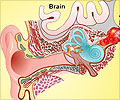While foreign accent syndrome (FAS) has been linked to damage in certain brain areas of the person sounding foreign, scientists now say that this condition may lie in the ears of the listeners.
While foreign accent syndrome (FAS) has been linked to damage in certain brain areas of the person sounding foreign, scientists now say that this condition may lie in the ears of the listeners.
This proposition comes after a team of researchers found two people with no trace of brain damage who have nevertheless sounded foreign since childhood.Peter Marien, a neurologist at Middelheim General Hospital and the University of Antwerp, Belgium, who led the study, said that the new finding could prompt neurologists and linguists to rethink the origins of FAS and may even point towards a genetic cause.
"There is no such thing as one simple recipe that explains what happens to a person who has foreign accent syndrome," New Scientist quoted him as saying.
Sheila Blumstein, a cognitive linguist at Brown University in Providence, Rhode Island, who was not involved in the study, said: "A lot of us have concluded that foreign accent syndrome is in the ears of the beholder."
Blumstein meant that one person's Czech-sounding accent could remind another person of Russian and yet another of French. In fact, studies of FAS patients have shown that listeners show little agreement in assigning an accent to a particular language.
In the new study, Marien found that different listeners in a panel thought a 29-year-old woman known as TL sounded French, German, Scandinavian or Moroccan when she spoke her native Dutch.
Advertisement
Marien said that neither patient had a history of brain trauma, and, in the case of KL, magnetic-resonance brain imaging showed no abnormalities.
Advertisement
The study is published in the journal Cortex.
Source-ANI
SRM














